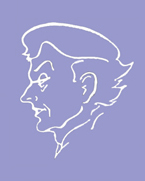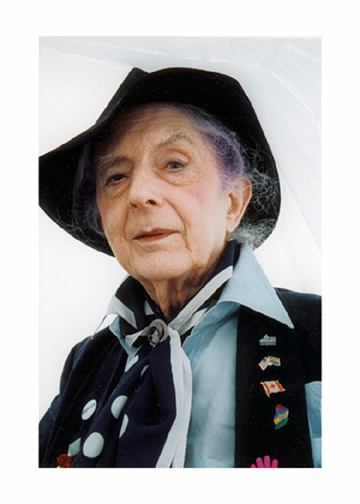|
|
|
 |
THE QUENTIN CRISP ARCHIVES
|
PHILLIP WARD Editor, The Dusty Answers (as I have said before) Executor, Estate of Quentin Crisp |
|||||
|
You Can't Be Serious!
“My life that I sort of got fixed in my head, that's the way I am and I don't alter it at all.” |
|||||
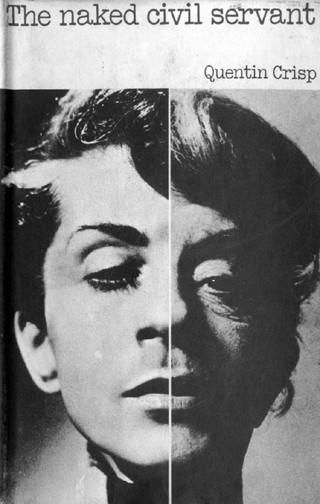 An alert 90-year old Quentin Crisp, with travel companion Chip Shell at his side, boarded a flight from New York to England determined to meet his obligations with Authors on Tour and because he simply wanted to go and perform his one-man show. That is what he had done since the late 1970s, and he was not ready to retire a lifetime of the profession of being. An alert 90-year old Quentin Crisp, with travel companion Chip Shell at his side, boarded a flight from New York to England determined to meet his obligations with Authors on Tour and because he simply wanted to go and perform his one-man show. That is what he had done since the late 1970s, and he was not ready to retire a lifetime of the profession of being. Quentin’s health had been on decline since the previous winter, but that did not stop him from accommodating others. His “Sacred Book”, daily planner, was filled with lunches and dinner dates, afternoon photo shoots, and engagements that ran late into the evening. And despite expressed worried concern by various friends, advisers, and admirers, Quentin listened only to himself to make life’s decisions and refused to allow others to take that freedom from him—except in death, perhaps. England was his land of birth and Quentin knew he was dying. He wanted to visit one last time before greeting Death at bedside. There is nothing more to it than that. He may have disliked his life in England, which obviously left an indelible impression on his being throughout his life, but that was the past and now was the present. And as with all of us, we grow older, reassess the past and move forward. It is a natural process, a pattern of what it is to be human, and an experience we all have. Plus, going on tour meant he was being paid. Quentin believed in money, but more for saving than spending. However, he did spend money and shared it with others, including the homeless on New York’s streets. 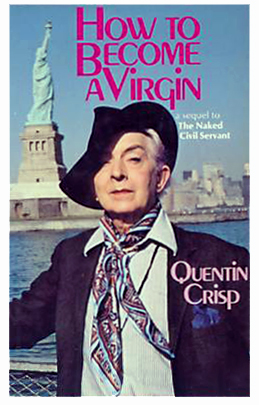 The self-styled stately-homo Quentin Crisp knew he might die while on tour, particularly so as with his age more than his health, but he hoped that Death would hurry on anyway. I doubt he committed suicide, though. It was not his nature. He may have desired to close the curtain on this side of the stage, but he was not one to pull the cord to make it happen. He liked living, but it was the decline of the quality of life caused by his failing body that bothered him and embarrassed him. Still, he did not care where or what city his body might expire. It just so happened that it was in Manchester and on the eve of the tour of his one-man show, An Evening with Quentin Crisp. The self-styled stately-homo Quentin Crisp knew he might die while on tour, particularly so as with his age more than his health, but he hoped that Death would hurry on anyway. I doubt he committed suicide, though. It was not his nature. He may have desired to close the curtain on this side of the stage, but he was not one to pull the cord to make it happen. He liked living, but it was the decline of the quality of life caused by his failing body that bothered him and embarrassed him. Still, he did not care where or what city his body might expire. It just so happened that it was in Manchester and on the eve of the tour of his one-man show, An Evening with Quentin Crisp.In The Last Word (formerly titled Dusty Answers,unpublished), Quentin Crisp writes, “I’m tired of it already, and I hope that death is just nothing. And as death approaches, I welcome it. I open my arms to it because my life has become wearisome, physically wearisome. I am covered with sores from my eczema. I creak all over my joints from rheumatism. I have cancer of the prostate gland. I have a bad heart. What more could go wrong! Lose all my hair? I visualize death as coming more or less as spontaneously, but I shan’t do anything, that the world will go dark, that I shall feel cold, that I shan’t be able to hear anything, that it will go silent and dark. And that I shall float away and not yell when people say, ‘Quentin! Quentin! Are you there? Are you alive?’ I shan’t answer. It’ll be wonderful!” 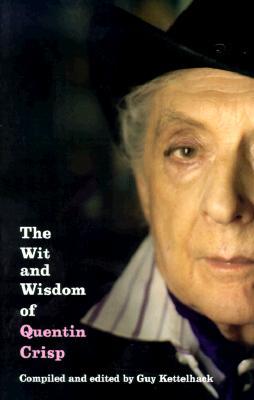 Quentin knew that the cabin pressure of the two planes transporting him to Manchester would most likely injure his heart greatly. The flights might even cause him death. He was happy and welcomed the idea and chance of such occurrence. But suicide? Are you serious! “I think that suicide is a very good idea. But I'm a terrible sissy and I can't imagine throwing myself out a window or onto a railway line or something like that. I do long for death and why don't I kill myself. I would never commit suicide, but I've thought about it.” Suicide was the farthest thing from Quentin’s imagination and he would have never committed it. He was actively living too much to even try suicide! I do not think he planned any of his dying for publicity hounding or anything like that. Sounds ludicrous to me, actually. And he always quipped to any listener the “I want to die a significant death” routine. He wanted to be shot by a policeman, as it would have been a significant death, but it had been done before! For goodness sake, he told you, told us, what we wanted to hear! Quentin knew that the cabin pressure of the two planes transporting him to Manchester would most likely injure his heart greatly. The flights might even cause him death. He was happy and welcomed the idea and chance of such occurrence. But suicide? Are you serious! “I think that suicide is a very good idea. But I'm a terrible sissy and I can't imagine throwing myself out a window or onto a railway line or something like that. I do long for death and why don't I kill myself. I would never commit suicide, but I've thought about it.” Suicide was the farthest thing from Quentin’s imagination and he would have never committed it. He was actively living too much to even try suicide! I do not think he planned any of his dying for publicity hounding or anything like that. Sounds ludicrous to me, actually. And he always quipped to any listener the “I want to die a significant death” routine. He wanted to be shot by a policeman, as it would have been a significant death, but it had been done before! For goodness sake, he told you, told us, what we wanted to hear!Plus Quentin grew up in and was heavily influenced by another time, a rather Victorian one, and it dictated his entire being, through and through, until the day he died. The curse of homosexuality was not because he was homosexual; it was because of the pain he experienced being a flamboyant gay man in a time when such display was not acceptable. His peacock feathers were not in fashion until the Sixties, but he braved on daringly. And at the end of his life, sexuality was not part of his character of being. It was a history, and only that. 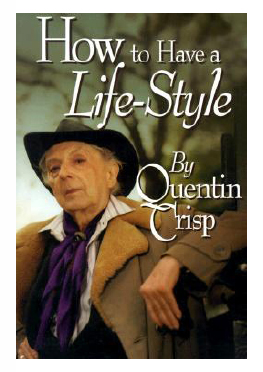 “I don't think I ever questioned my sexuality, my identity, my gender, or my dream about myself. It folded round me. And now at the age of ninety, it has been explained to me that I am not really a homosexual. I’m a transgender. But actually I am asexual. I don’t have sex. But you see, I don’t see myself as a homosexual. I don’t see myself as a man. I know I’m not a woman, of course. I know that perfectly well. “ “I don't think I ever questioned my sexuality, my identity, my gender, or my dream about myself. It folded round me. And now at the age of ninety, it has been explained to me that I am not really a homosexual. I’m a transgender. But actually I am asexual. I don’t have sex. But you see, I don’t see myself as a homosexual. I don’t see myself as a man. I know I’m not a woman, of course. I know that perfectly well. “Thus the curse one would wish on his worst enemy is only the wish that other gay men and women not experience the hell and torture he lived before moving to New York City, where he lived to be a “frail” queen, while continuing to travel the planet performing on stage living in his profession of being. But being gay today is nothing like it was in his time, or 100, 75, 50, or even 25 years ago. We have advanced forward with incredible force, positively, and have become much of the mainstream that homogenization is our daily reality. Quentin was not like that. He rubbed against the grain for nearly 91 years expressing and displaying his individuality. That is pretty awesome. He was a trailblazer. He was a trendsetter! He was singular. He was unique. I am not sure what the film, An Englishman in New York, will offer us at its world premiere at the Berlin International Film Festival on February 11th. The movie stars John Hurt as Quentin Crisp, Jonathan Tucker, Denis O’Hare, Swoosie Kurtz, and Cynthia Nixon. It has a fine cast and I am certain it will be an entertaining movie, especially with the fine writing of Brian Fillis and the production teams of Leopardfilms and ITV. Needless to say, as it is about Quentin’s life in New York, particularly when he didn’t believe in “living abroad”, the movie will be a story about a splice of his life, and one that will be entertaining and engaging. 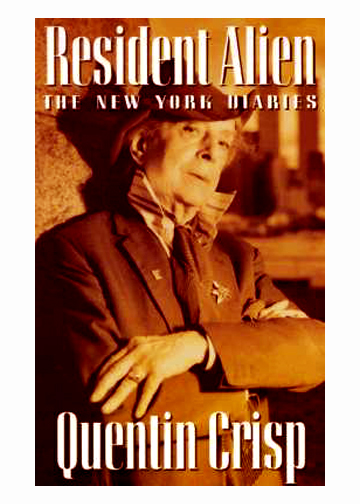 As for Quentin’s tour of England, it was originally arranged in early 1999, canceled by forces not his own, then placed back on schedule before summer’s end with a little drama spliced between the pages of the day. He had read the script for Resident Alien and remained unhappy about agreeing to do it. He feigned any liking it because, in the end, it was to be money in his pocket, of which it has never come to be. You see, Resident Alien, the play by Tim Fountain and Quentin Crisp, was created as a contractual agreement between the two men in 1999 with a 50/50 financial agreement. To this date [2009], no money has ever been paid Mr. Crisp’s copyright holders from Mr. Fountain for any of the performances of the play in all the venues around the globe, which make it a rather curious way for Mr. Fountain to mark the anniversary of Mr. Crisp’s centenary. As for Quentin’s tour of England, it was originally arranged in early 1999, canceled by forces not his own, then placed back on schedule before summer’s end with a little drama spliced between the pages of the day. He had read the script for Resident Alien and remained unhappy about agreeing to do it. He feigned any liking it because, in the end, it was to be money in his pocket, of which it has never come to be. You see, Resident Alien, the play by Tim Fountain and Quentin Crisp, was created as a contractual agreement between the two men in 1999 with a 50/50 financial agreement. To this date [2009], no money has ever been paid Mr. Crisp’s copyright holders from Mr. Fountain for any of the performances of the play in all the venues around the globe, which make it a rather curious way for Mr. Fountain to mark the anniversary of Mr. Crisp’s centenary.Yes, Quentin was aware of his death being a moment of publicity for his life and its story, as it was inevitable. After all, he is and was Quentin Crisp. There is or was no other. But not for Quentin, he would be gone. And once dead, that is it. A bag of bones and then a box of ashes. I do not give any support to the planned publicity upon his death, though. What would be the benefit? The logic does not match reason. He was not that egotistical as some are, or think him to be. However, truth and reality is Quentin was not averse to self-publicity. We all are. You are. Tim Fountain is with writing something as trite as “Or the truth about the mysterious circumstances surrounding his death which, I believe, I have uncovered?” Was not his recent article just that, publicity for “my play about him, Resident Alien, is being revived next week”? Or Bette Bourne is via Resident Alien’s success in London. But then with Bette, Quentin would approve of such action. “There is a man named Mr. Bloolips, who is also called Mr. Bourne and he is going to play the part of me in some show in England. He’s going to do a performance in which he imitates me, and I think his imitation of me is the whole show. He’s very nice. I like him very much. He will portray me and he will do it very well. “ Quentin’s drinking was not anymore than what you or I would do on any given evening or social occasion. So, on the plane ride toward London, Quentin drank the small bottles of scotch, which are barely a glassful. And since he never drank scotch on the rocks, the volume was greater. The ice always melted and diluted the drink. It was always, ‘Scotch and water. And no ice, please. Thank you.” So riding across the Atlantic, Quentin enjoyed his drink. What’s the issue? 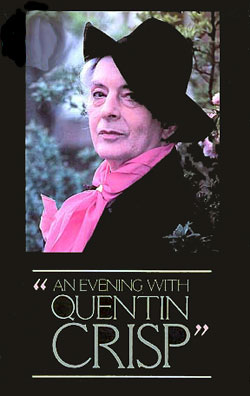 And regarding Quentin’s estate, it was a worthy sum, but nothing to be judgmental about. Although Quentin claimed never to work, he worked and saved his money. He did not spend it but shared it willingly and unselfishly. He once told an acquaintance that his money was for his family upon his death. “That’s what you do. You give what you have to your family.” And that is what he did with securing an updated Last Will and Testament, coincidentally a week before his death. And after signing the Will, he did say, “Now I can die!” So what! Wills are for post-death affairs! Still, Quentin’s disguise was his public face, while his heart was spoken elsewhere as with his close friends and family. Quentin did not have a “secret family”, either here or abroad. Wherever that came from is a mystery. He had regular and open communication with his extended family, and they accepted him for who he was without judgment. And regarding Quentin’s estate, it was a worthy sum, but nothing to be judgmental about. Although Quentin claimed never to work, he worked and saved his money. He did not spend it but shared it willingly and unselfishly. He once told an acquaintance that his money was for his family upon his death. “That’s what you do. You give what you have to your family.” And that is what he did with securing an updated Last Will and Testament, coincidentally a week before his death. And after signing the Will, he did say, “Now I can die!” So what! Wills are for post-death affairs! Still, Quentin’s disguise was his public face, while his heart was spoken elsewhere as with his close friends and family. Quentin did not have a “secret family”, either here or abroad. Wherever that came from is a mystery. He had regular and open communication with his extended family, and they accepted him for who he was without judgment.Now, something that’s truly a “secret” and a “shock revelation”, and something I discovered while gathering information for the lawyers of the estate, is that Quentin wrote checks for various AIDS organizations on regular basis, often monthly, despite his public declaration about HIV/AIDS was a fad and that we have a choice of being positive or not. Quentin was very generous to many causes, thus an exploration into the contradictions that surround Quentin Crisp. Quentin's “funeral” was quiet and simple, and primarily family as per Quentin’s directive. Chip understood Quentin’s wishes and abided by his Will, and only a few people where invited to the private service. Quentin did not want a funeral and this was not a traditional funeral per se. And, indeed, Quentin was cremated in Manchester and ashes sent back to New York. The cost of processing Quentin’s death was not paid by the DSS. I wrote the estate checks paying for all services rendered. The English need not worry for any costs regarding Quentin’s passing. Quentin paid for it out of his own pocket! He lived it. He paid for it, through and through, for nearly 91 years of experiencing it. So, truly, there was “no fuss”. All else is gratuitous and superficial, and rather platitudinous. I do not get the “macabre” aspect of coincidence. The three names of life and death: Denis Pratt, Quentin Crisp, and Bernard Smith. Then PC Sissy and the body drop. And Quentin’s cremains first-classed on return to New York City. Maybe it is an English humor I do not grasp, but this synchronicity is not a macabre moment. It is just a coincidence and nowhere near any sort of suicidal contemplation. That is a riot! A hysterical concept. Truly. Quentin would have the last laugh at that proposition. “And when asked about my life’s legacy, I don’t think I have left anything to anybody. I have tried to do right by them. I have my life and view my life as negative, really, yet I try not to do any harm. Rather than I try to do good, because doing good is so very difficult and you mostly don’t know what is good for people. And if I am not careful, you give people what you think they deserve. And that’s a bad idea. So my legacy is nothing. When I have gone, as Keats said, ‘My name will be written in water.’” And as for that empty bottle, there is only one truth and one reality. There is no way Quentin could have carted the liquor bottle up the stairs by himself. He needed his right hand to pull himself up and forward, while holding the left hand crooked and close to his person for balance, thus being unable to grip any sort of bottle either in the hand’s clutch or the crook of the elbow. Impossible. I was informed by Chip upon his return with Quentin’s ashes that he and several individuals surrounding Mr. Crisp’s tour had gathered in the dying room the night following Quentin’s death and had a celebration in which they got finished off the bottle of brandy that had been shared with Quentin upon his arrival in Manchester the night before. So, the myth of a mysterious empty bottle devised by this troupe is a bit peculiar, I would say, and one in which I feel is a bit bizarre to have been created rather than offering what is truth. 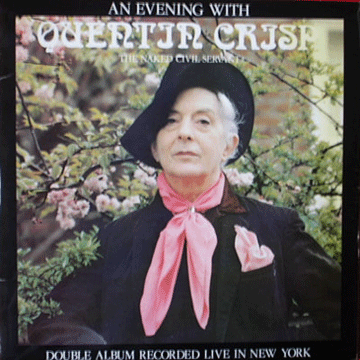 Quentin Crisp died in 1999, and was born 100 years ago. To mark this anniversary, The Quentin Crisp Archives (crisperanto.org) has uploaded new pages titled “Quentin Crisp: The Naked Bon Vivant! A centennial celebration!” and invites the world at large to read and to contribute their tributes celebrating his life and legacy over the year ahead. Also, the public can visit Quentin Crisp's purple fedora on view in "Hats: An Anthology by Stephen Jones" at the Victoria and Albert Museum from February 24 to May 31 this year. And then there is the world premiere of An Englishman In New York, with John Hurt reprising his role as Quentin Crisp.
Quentin Crisp died in 1999, and was born 100 years ago. To mark this anniversary, The Quentin Crisp Archives (crisperanto.org) has uploaded new pages titled “Quentin Crisp: The Naked Bon Vivant! A centennial celebration!” and invites the world at large to read and to contribute their tributes celebrating his life and legacy over the year ahead. Also, the public can visit Quentin Crisp's purple fedora on view in "Hats: An Anthology by Stephen Jones" at the Victoria and Albert Museum from February 24 to May 31 this year. And then there is the world premiere of An Englishman In New York, with John Hurt reprising his role as Quentin Crisp. Quentin’s name may be written on water and his life history a legacy in our reality, but his influence remains ever present and significant, despite having died alone in a bedroom in Manchester one month before his 91st birthday. It was not a suicide as suggested in Mr. Fountain’s writings. It was life coming to an end naturally for an old man with a body that was falling apart. I am happy he died alone and with the nitro pills in his hand. It definitely demonstrates he wanted to live. And as for the “truth about the mysterious circumstances surrounding his death which, I believe, I have uncovered,” there is no there there! There is no mystery. Quentin’s life is and was an open book. Read it.
|
|||||
Photograph copyright © by Phillip Ward. Used by permission. All rights reserved.

Site originally designed by:

Luczak photo by Lou Miranda.

Site Copyright © 1999–2015 by the Quentin Crisp Archives.
All rights reserved.
